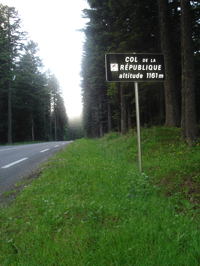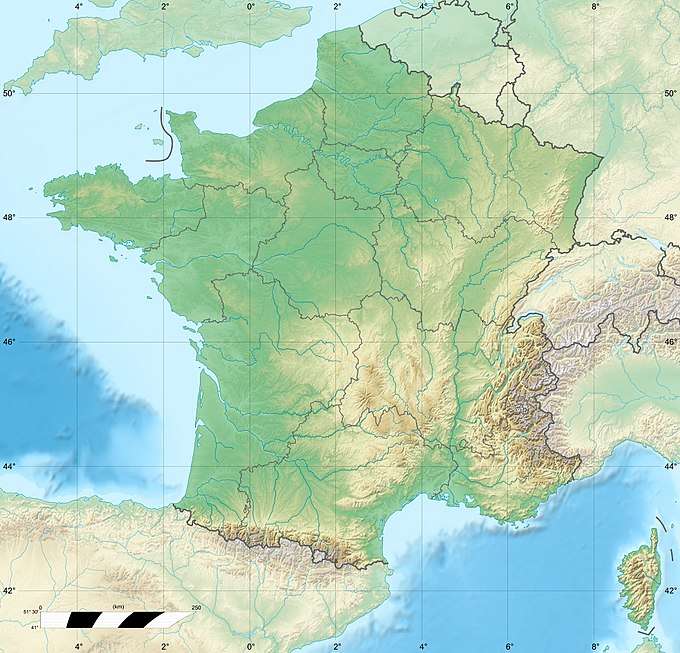Col de la République
The Col de la République or Col de Grand Bois (1,161 m (3,809 ft)) is a mountain pass in the Pilat massif within the Pilat Regional Natural Park in the Loire department of the Rhône-Alpes region in southern France. Located on the D1082 (ex-RN 82 ) in the commune of Saint-Genest-Malifaux, it connects Saint-Étienne with Annonay in the Rhône valley. The road was constructed in 1830 and the col has an altitude of 1,161 metres.
| Col de la République Col de Grand Bois | |
|---|---|
 Col de la République | |
| Elevation | 1,161 m (3,809 ft) |
| Traversed by | D1082 |
| Location | Loire, Rhône-Alpes, France |
| Coordinates | 45°19′58″N 4°28′49″E |
 Col de la République Location of col de la République | |
It was the first climb on the first Tour de France in 1903, but was the scene of notorious violence in 1904 that involved fighting and officials firing gunshot warnings. It has been part of the route on 13 occasions.
History

The name 'La République' and that of the nearby hamlet of 'La République' derive from the attempt by members of the Beguine religious sect to found an independent community there called the Republic of Jesus Christ.[1] The Beguines were well established in Saint-Jean-Bonnefonds, but in November 1794 they moved 20 kilometres to the plateau to be ready for the arrival of the prophet Elijah.[2]
Cycling
Details of the climb
From Saint-Étienne (north), the climb is 17 km long. Over this distance, it gains 644 m at an average of 3.8%. The maximum gradient is 6.3%.[3]
From the south, the climb starts at Bourg-Argental; from here, the ascent is 12 km long, climbing 626 m at an average of 5.2%, with a maximum of 7.9%.[4]
Vélocio

At the top is a monument in memory of Paul de Vivie, who wrote under the pseudonym Vélocio and was important in the development of bicycle touring. The col de la République was his favourite morning ride.[5][6] Every year since 1922 the volunteers of the 'Comité Vélocio de Saint-Étienne' have organized the Journée Vélocio (Vélocio Day-Trip), a 12.788 km climb of the col.[2][5][6][7]
Tour de France
The col de la République was the first pass of over 1,000 metres crossed by the Tour de France, in 1903 during the second stage of the first Tour de France (Lyons - Marseilles via Saint-Étienne) when Hippolyte Aucouturier was the first rider to reach the summit.[8]
The following year, in the 1904 Tour de France, it was the scene of some of the most notorious violence in the history of the tour when supporters of the regional favourite Antoine Fauré attacked his opponents.[9][10] This caused the organizers to avoid the Loire department until the 1950 Tour de France. In 1905, the tour's organiser Henri Desgrange chose to ignore the col de la République, and focused instead on the introduction of the Ballon d'Alsace, because he saw that he had missed the opportunity of publicity previously.[11]
In the 1904 incident, Andre Fauré led the race and 200 fans tried to stop the rest of the cyclists from following him. Garin hurt his hand during the incident, and Giovanni Gerbi had to give up with broken fingers.[12] The situation was only solved after race officials fired shots in the air.[13] Further on, nails and broken glass had been spread along the road, which caused many flat tires.[14] Because of this help, Fauré was the first on top of the col, but was over-taken by the favourites later.[15]
At the summit a sign post says
- Col de la République
- 1er col à plus de 1000 mètres franchi par le tour de France cycliste le 5 juillet 1903
- (The 1st col higher than 1,000 metres traversed by the cycling Tour de France on 5 July 1903)
Appearances
The col has been used 13 times in the Tour de France, and the first rider to cross the summit on each occasion was:[16][17]
| Year | Stage | Category | Start | Finish | Leader at the summit |
|---|---|---|---|---|---|
| 1997 | 13 | 3 | Saint-Étienne | L'Alpe d'Huez | |
| 1978 | 10 | 3 | Saint-Étienne | Grenoble | |
| 1971 | 10 | 3 | Saint-Étienne | Grenoble | |
| 1968 | 18 | 3 | Saint-Étienne | Grenoble | |
| 1966 | 19 | 2 | Chamonix | Saint-Étienne | |
| 1963 | 16 | 3 | Saint-Étienne | Grenoble | |
| 1961 | 9 | 2 | Saint-Étienne | Grenoble | |
| 1959 | 17 | 2 | Saint-Étienne | Grenoble | |
| 1956 | 19 | 2 | Grenoble | Saint-Étienne | |
| 1954 | 17 | 2 | Le Puy-en-Velay | Lyon | |
| 1950 | 19 | 3 | Briançon | Saint-Étienne | |
| 1904 | 2 | Lyon | Marseille | ||
| 1903 | 2 | Lyon | Marseille | ||
References
- Pascal Chambon, La Loire et l'Aigle: Les Foréziens face à l'État napoléonien, Saint-Étienne: Université de Saint-Étienne, 2005, ISBN 978-2-86272-351-8, p. 161 (in French)
- Berlier, Patrick. "Une flânerie du Grand Bois au Creux du Loup" (in French). www.forez-info.com. Retrieved 20 July 2012.
- "Col du Grand Bois: Saint Etienne". www.climbbybike.com. Retrieved 20 July 2012.
- "Col du Grand Bois: Bourg-Argental". www.climbbybike.com. Retrieved 20 July 2012.
- Peter Nye, The Cyclist's Sourcebook, New York: Perigee, 1991, ISBN 978-0-399-51705-1, p. 100.
- John Krausz, Vera van der Reis Krausz, and Paul Harris, The Bicycling Book: Transportation, Recreation, Sport, New York: Dial, 1982, ISBN 978-0-385-27666-5, p. 68.
- Joe Friel, Cycling Past 50, Ageless athlete series, Champaigne, Illinois: Human Kinetics, 1998, OCLC 761543146,pp. 235–36.
- Woodland, Les (2003). The Yellow Jersey Companion to the Tour de France. Yellow Jersey Press. p. 264. ISBN 0-224-06318-9.
- Woodland, Les (2007), The Yellow Jersey Guide to the Tour de France, Yellow Jersey, UK, p.99
- "Tour 1904 : mort de son succès". Vélo 101, le site officiel du vélo (in French). Velo101.com. 30 October 2001. Retrieved 20 July 2012.
- Van den Bogaart, Ronnie (10 November 2007). "Col de la République was eerste berg in Tour de France" (in Dutch). Sportgeschiedenis. Archived from the original on 26 February 2012. Retrieved 23 July 2012.
- McGann, Bill; McGann, Carol (2006). The Story of the Tour de France. Dog Ear Publishing. pp. 10–13. ISBN 1-59858-180-5. Retrieved 29 December 2009.
- "No centenary party for 1904 Tour of shame". Reuters. 8 July 2004. Archived from the original on 21 October 2012. Retrieved 18 March 2009.
- "Vélocipédie - Le Tour de France". Le Petit journal (in French). Gallica Bibliothèque Numérique. 11 July 1904. p. 5. Retrieved 16 March 2010.
- "2ème Tour de France 1904 - 2ème étape" (in French). Mémoire du cyclisme. Retrieved 9 March 2010.
- Mémoire du Cyclisme - Col de la République Archived July 27, 2011, at the Wayback Machine
- "Le col du Grand Bois ou de la République dans le Tour de France depuis 1947" (in French). ledicodutour. Retrieved 20 July 2012.
External links
| Wikimedia Commons has media related to Col de la République. |